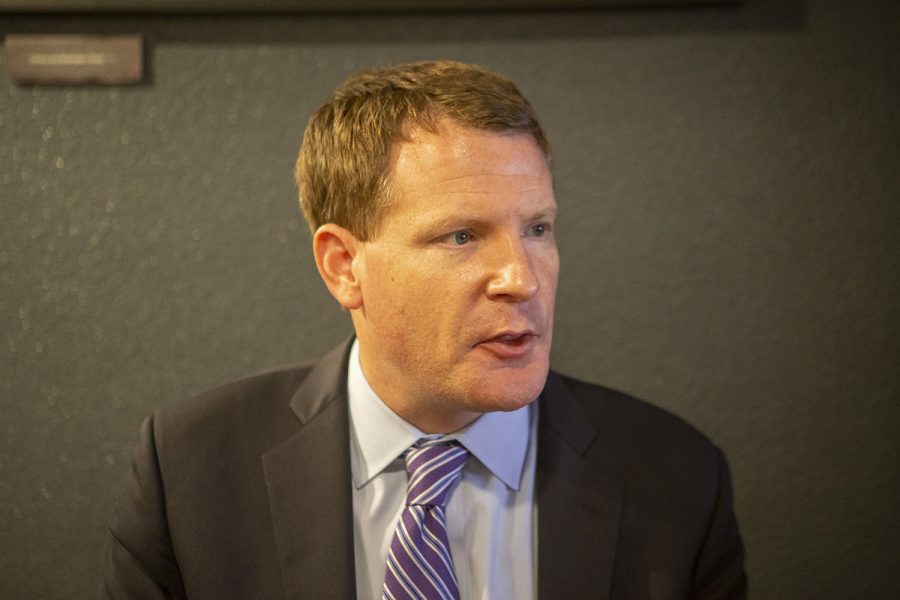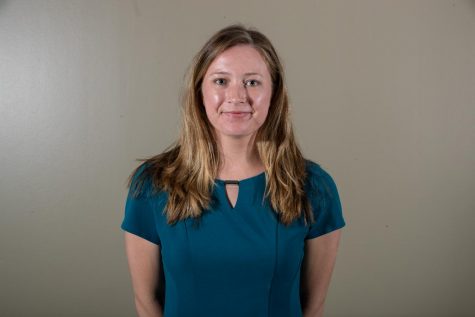How a University of Iowa grad became a central Republican strategist in the Kavanaugh hearings, Trump impeachment
Behind the scenes of the Kavanaugh hearings and the Republican strategy for impeachment is Mike Davis, a conservative adviser known on Capitol Hill for his brash strategy.
Hayden Froehlich for The Daily I
Founder and president of the Article III Project, Mike Davis, talks about his organization’s goals of defending President Trump’s Supreme Court nominees in Java House on Thursday, October 17th, 2019. Davis and his team helped defend Brett Kavanaugh during his indigictment proceedings.
October 25, 2019
University of Iowa graduate Mike Davis is a Republican strategist best known for his brash rhetoric and being a central figure in pushing through President Donald Trump’s court nominees, including the high-profile confirmation of then-judge Brett Kavanaugh.
The 2000 UI graduate led a team of lawyers from 2017 to the spring of 2019 to advise the Senate Judiciary Committee on Trump’s court picks, helping to push through 43 of Trump’s nominations to the U.S. Court of Appeals so far — more than any other president at this point in their tenure. He worked closely with Iowa’s senior senator, Republican Chuck Grassley, who at the time headed the committee.
During his time there, he developed a reputation as being tough on the issue of judicial appointments, said George Hartmann, Grassley’s then-press secretary for the judiciary committee.
Davis was key in withholding documents relating to Kavanaugh’s work in the White House, Hartmann said, with Davis often butting heads with the minority leader’s office.
“Mike was the tip of the spear at holding the line on which documents were not relevant,” Hartmann said, describing Davis as “tireless and also somewhat stubborn and confrontational.”
The office of California Sen. Dianne Feinstein, the ranking member of the Senate Judiciary Committee, declined to comment for this story.
The Kavanaugh hearings, roiled in controversy after Professor Christine Blasey Ford came forward with sexual-assault allegations against Kavanaugh while the two were in high school, ended with Kavanaugh being confirmed to the Supreme Court in a 50-48 vote.
In September 2018, quickly deleted tweets from during the Kavanaugh hearings received sharp criticism. Davis wrote on Twitter, “Unfazed and determined. We will confirm Brett Kavanaugh.”
That was seen as implying that he was dismissive of Blasey Ford’s claims. In an interview, Davis said the office fully investigated the claims.
Four Democratic senators who voted against Kavanaugh lost their seats in the November midterm elections. For Davis, his often 20-hour days at the office during the month of time going to the Kavanaugh hearings crafting strategy can translate to the impeachment inquiry now.
“What we experienced with the Kavanaugh fight is if the Republicans in the House, and then Republicans in the Senate, grow a backbone — then we can win this fight,” he said, referring to Republicans defending the president over impeachment.
In the fall of 1998, then-UI student Mike Davis answered a call that would shape his future philosophy on politics, and especially his view on impeachment now.
The Office of Independent Counsel called the House Speaker’s office, where Davis was an intern at the time, to announce that the impeachment report against then-President Bill Clinton would be dropped off for House Speaker Newt Gingrich.
Davis watched as Republicans blasted the airwaves with ads about the Clinton scandal in the months leading up to the November elections. Republicans were expected to increase their majority in the House after Nov. 3, but instead, Democrats flipped four seats, eroding Republicans’ 55-45 seat control.
House Republicans largely blamed Gingrich for the strategy, and he announced he would step down from the speakership a few days later. Davis’ last day of his internship, Dec. 19, 1998 (and the last day of the session), the House voted to impeach President Clinton.
Davis’ strategy for Republicans getting through the impeachment inquiry harkens back to his experience in 1998.
“They (Democrats) need to think about the tremendous blowback they’re going to get from American voters — the wrath,” Davis said about the impeachment inquiry in an interview at Heirloom Café Oct. 17 after giving a speech at the UI College of Law. He added that as long as Republicans doggedly continued to push back on Democrats’ narratives, correct misinformation, and keep up public appearances, they could weather the impeachment inquiry, and gain seats in 2020.
This past spring, Davis founded the Article III Project, a political communications group with a goal to be more politically aggressive in defending Trump’s judicial picks. The title of the organization refers to Article III of the U.S. Constitution, which established the judicial branch.
That organization, Davis said, is a way to go on the offensive to defend President Trump’s court nominees who are already confirmed (he called them “sitting ducks”), to encourage confirmation of new nominations, and prevent efforts to alter the court such as adding justices.
“I told this to the New York Times that what we’re doing with the Article III Project is taking off the gloves, putting on the brass knuckles and punching back,” he said. “And what we showed with the Kavanaugh fight and the election after the Kavanaugh fight is that the left has a big glass jaw. And if you punch back, you can break it.”
As he advises Republicans to ramp up their rhetoric against Democrats, he said he doesn’t care whether he’s contributing to a politicized climate in the country.
“Remember, our founding fathers shot each other in a duel,” he said. “We’ve had contentious political fights. We’ve been a raucous republic for over 200 years. So now, I’m not going to be polite or kind when people were being unfairly attacked.”
He graduated from the UI with a degree in political science and a minor in journalism in 2000. During his time as an undergraduate, he grew close with political-science Professor Tim Hagle, who advised Davis’ Students for George W. Bush chapter, and took Davis up on a job recommendation working with the Bush administration’s Justice Department.
Hagle said Davis’ hallmark was being able to hop from job to job while being effective in a short amount of time. He recalled when Davis took a constitutional-law class as a second-year undergraduate at the UI, an upper-level class which Hagle advised against taking as a freshman or sophomore.
“I announced usually in that class that if you’re a freshman or sophomore that it’s going to be over your head,” he said. “And he basically took that as a challenge.”
Davis returned to Iowa City in 2008 for a law degree, befriending law Professor Sheldon Kurtz, who said he and Davis frequently debated over the appropriate role of the judiciary. But, he said, they were always respectful and he was proud of his former students’ accomplishments.
“We like to banter with each other about politics,” he said. “I’m sure you know, he’s a devout conservative, and I am a very devout liberal.”
Davis didn’t come from a conservative background. He was raised by two liberal Des Moines public school employees. His teachers awarded him the Alex P. Keaton award in sixth grade, referencing the fictional character in the show Family Ties who parted ideology from his parents, who were hippies in the 1960s.
His mom, he said has switched to favor Republican views, but his dad flip-flops on issues.
Before returning to Washington in 2017, he spent 10 years as a civil litigator in Colorado. He said he liked to stay in Washington for short, impactful periods of time, and would like to move to Colorado or Iowa when he feels his work is done.
“The problem is that when you stay in D.C. too long you end up in prison,” he said with a low chuckle.















